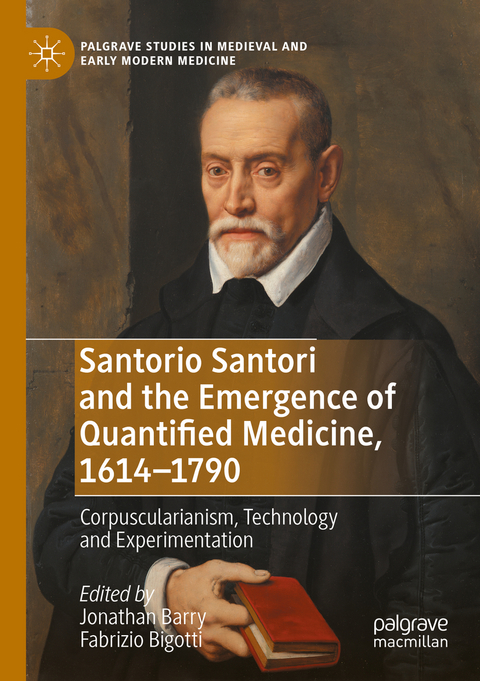
Santorio Santori and the Emergence of Quantified Medicine, 1614-1790
Springer International Publishing (Verlag)
978-3-030-79589-4 (ISBN)
This book examines the life and works of Santorio Santori and his impact on the history of medicine and natural philosophy. Reputed as the father of experimental medicine and procedures, he is also known for his invention of numerous scientific instruments, including early precision medical devices (pulsimeters, hygrometers, thermometers, anemometers), as well as clinical and surgical tools. The chapters in this volume explore Santorio's legacy through the seventeenth and eighteenth centuries. They highlight the role played by medical practitioners such as Santorio in the development of corpuscularian ideas, central to the 'new science' of the period, and place new emphasis on the role of the life sciences, chemistry and medicine in encouraging new forms of experimentation and instrument-making.
Chapters 1 and 2 are available open access under a Creative Commons Attribution 4.0 International License via link.springer.com.
Jonathan Barry is an Emeritus Professor of History at the University of Exeter, UK, and Guest Professor at LMU in Munich, Germany. He is an early modern social and cultural historian with a particular interest in the history of science, medicine and witchcraft, and co-editor of Palgrave Historical Studies in Witchcraft and Magic. He was co-founder of the Centre for Medical History at Exeter and a Wellcome Senior Investigator in Medical Humanities (2012-18) for a project on medical practice in England, Ireland and Wales 1500-1715. Fabrizio Bigotti is an intellectual historian with a specialisation in the history of science, medicine, and technology in the late medieval and early modern period (1300-1700). His publications include works on late-Renaissance Galenism, Santorio Santori, early modern corpuscularianism and precision instruments. His work focuses particularly on the history of quantification, being more broadly concerned with the role that classical and medieval philosophies played in the development of early modern logic, theory of matter, anatomy, and physiology. He is the founding director of the Centre for the Study of Medicine and the Body in the Renaissance (CSMBR) and Research Fellow at the Institute for the History of Medicine at the Julius Maximilian University of Würzburg in Germany. Since 2018, he is also honorary research fellow at the College of Humanities of the University of Exeter, UK.
1. Introduction - Fabrizio Bigotti and Jonathan Barry.- 2. 'Gears of an Inner Clock': Santorio's Theory of Matter and its Applications - Fabrizio Bigotti.- 3. The Uncertainty of Medicine: Readings and Reactions to Santorio between Tradition and Reformation (1615-1721) - Fabiola Zurlini.- 4. Daniel Sennert's Response to Santorio Santori in the Light of Chymical Atomism - William R. Newman.- 5. Atoms, Mixture, and Temperament in Early Modern Medicine: The Alchemical and Mechanical Views of Sennert and Beeckman - Elisabeth Moreau.- 6. Regius between Santorio and Descartes: The Quantification and Mechanization of the Passions in Seventeenth-Century Medicine - Fabrizio Baldassarri.- 7. Santorio and Leibniz on Natural Immortality: The Question of Emergence and the Question of Emanative Causation - Andreas Blank.- 8. Santorio Santori on Plague: Ideas and Experience between Venice and Naples - Vivian Nutton and Silvana D'Alessio.- 9. 'An inquisitive man, considering when and where he liv'd': Robert Boyle on Santorio Santori and Insensible Perspiration - Salvatore Ricciardo.- 10. Giovanni Alfonso Borelli and Santorio on the Explanation of Fevers - Fabio Zampieri.- 11. Bodies in Balance: Santorio's Legacy in Baglivi's Medicine - Luca Tonetti.- 12. Disputing Santorio: Johannes de Gorter's Neurological Theory of Insensible Perspiration - Ruben Verwaal.- 13. The Influence of Santorio Santori on the Dietetics of Carl Linnaeus - Luciana Costa Lima Thomaz.- 14. Weighing Authority: Lavoisier's and Séguin's Reassessment of Santorio's Experiments on Transpiration - Francesca Antonelli.
| Erscheinungsdatum | 21.03.2023 |
|---|---|
| Reihe/Serie | Palgrave Studies in Medieval and Early Modern Medicine |
| Zusatzinfo | XXVI, 421 p. 35 illus., 23 illus. in color. |
| Verlagsort | Cham |
| Sprache | englisch |
| Maße | 148 x 210 mm |
| Gewicht | 577 g |
| Themenwelt | Geisteswissenschaften ► Geschichte ► Regional- / Ländergeschichte |
| Studium ► Querschnittsbereiche ► Geschichte / Ethik der Medizin | |
| Naturwissenschaften | |
| Schlagworte | Alfonso Borelli • Baglivi • Chymical Atomism • corpuscularianism • Daniel Sennert • experimentation • Galileo • Insensible Perspiration • Isaac Beeckman • Johannes de Gorter • Plague • Quantification • Santorio-Obizzi controversy • Theory of Qualities and Matter |
| ISBN-10 | 3-030-79589-6 / 3030795896 |
| ISBN-13 | 978-3-030-79589-4 / 9783030795894 |
| Zustand | Neuware |
| Informationen gemäß Produktsicherheitsverordnung (GPSR) | |
| Haben Sie eine Frage zum Produkt? |
aus dem Bereich


